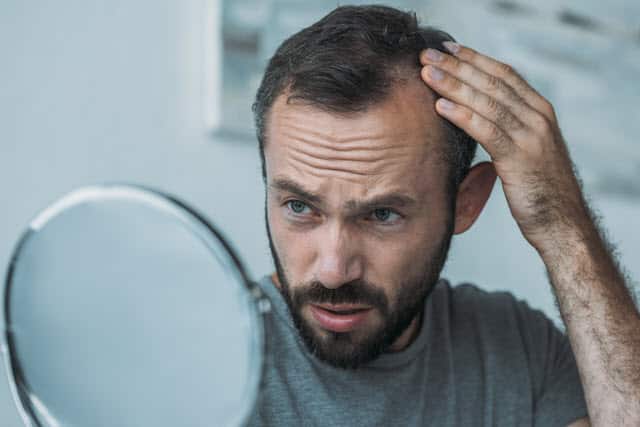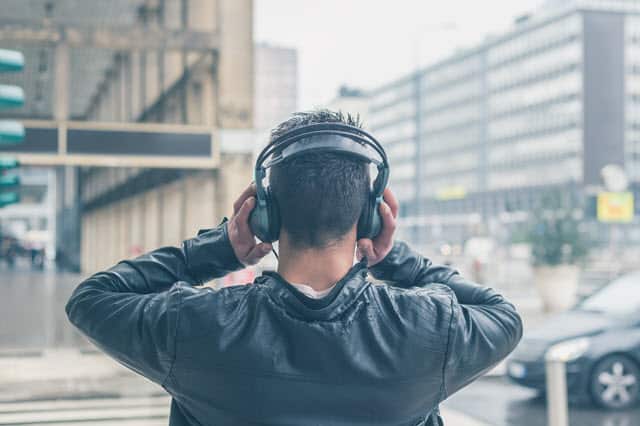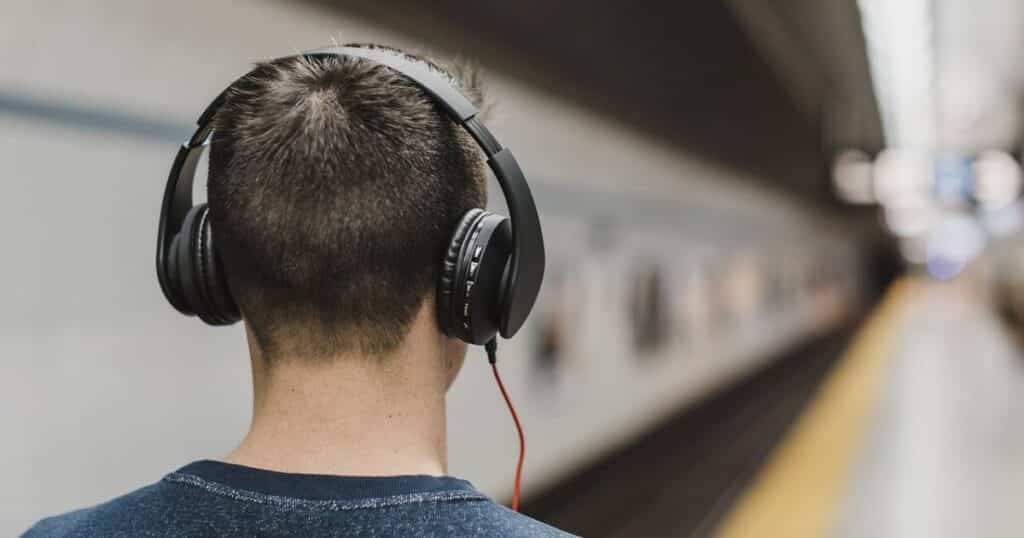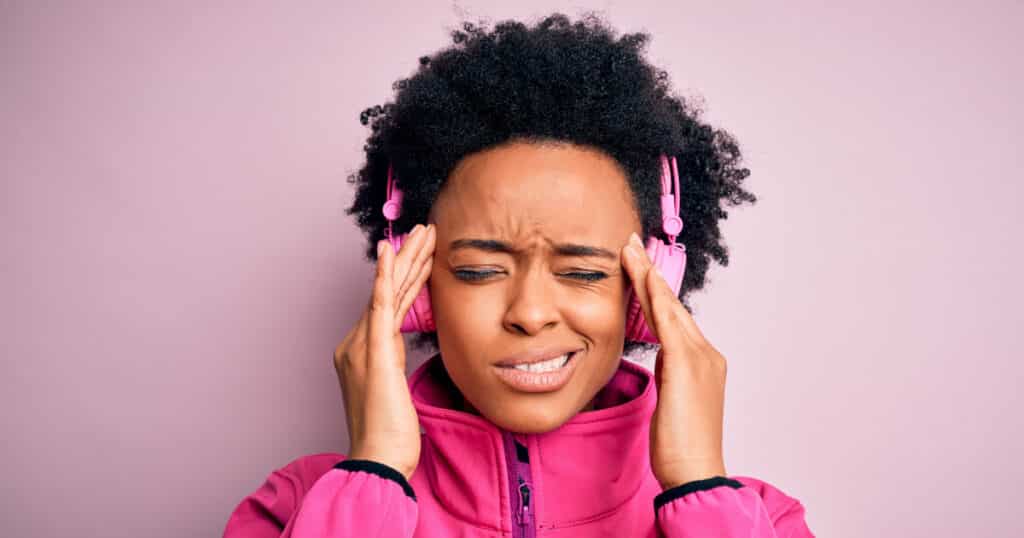The other day, a friend came to me and said she had noticed strands of her hair kept getting caught in her headphones. This is not unusual, and it’s not the first time someone has asked me about headphones and hair loss. Several of my male friends are concerned that the friction of their headphone set may damage or cause their hair to fall out. Do headphones cause hair loss? Not really, but they can accelerate it under certain circumstances.
In this article, I’ll go over whether headphones can trigger hair loss. We’ll also cover general causes of hair loss and I’ll share some best practices so you can prevent hair loss while using your headphones.
Let’s get to it!
So, Do Headphones Cause Hair Loss?
The short answer to this question is no, headphones do not cause hair loss. No matter how long you leave your headphones on, it won’t cause your hair to fall out. That said, headphones may worsen an existing hair loss problem, but wearing headphones cannot cause baldness or hair loss.

If you suddenly notice your hair falling out soon after you begin wearing headphones, you should contact your doctor, and examine your headphones to see if something about their design may be causing issues. You may also want to read up on my tips for wearing headphones with long hair.
What if you’re already balding?
You are most likely familiar with the term “Alopecia.” It is an autoimmune disease that can cause hair to fall out, resulting in patches of hair missing from the scalp.
Traction Alopecia, however, is a lot different in nature from autoimmune alopecia. This type of alopecia is baldness that is triggered by traction or friction to the hair follicles. Due to excessive pulling on the roots, hair begins to fall out.
When you wear your headphones for several hours every day, it can cause traction alopecia. Some people already experience traction alopecia from wearing too tight ponytails and braids. Regularly adjusting your headphones while wearing them causes you to rub against your scalp. This causes traction alopecia.
People who have short hair experience this more. With short hair, hair strands can be pulled individually, putting them at higher risk of becoming damaged.
Most Common Causes of Hair Loss
There are so many reasons for hair loss, and when you begin searching the internet for your symptoms, you’ll often find a result to match your biggest fear.

Here are some real causes of hair loss:
Genes
It’s true that hair loss is often genetic. However, most of us do not know that the genetics from your maternal side are responsible when it comes to hair loss.
Even if your dad has been bald for as long as you can remember, the chances are high that you’ll be okay. If your mom or your maternal grandfather are not bald, then you likely won’t go bald.
Hormonal Imbalance
Hormones play a huge role in how our hair grows, and hormonal hair loss is a thing. It’s split by differences in gender, too, due to the different hormones men and women have.
- Androgens, the male hormones, don’t support hair follicles and have been shown to shorten the hair growth cycle.
- Estrogens, the female hormones, are hair-friendly and promote hair growth for a more extended period.
If you have an excess of androgen, you’re more likely to suffer hair loss. This is the cause of male-pattern baldness, too. Higher levels of testosterone are associated with higher androgen levels, which cause the hair on your head to fall out.
There are treatments you can look into to slow hair loss. Minoxidil, more popularly known as Rogaine, is available over the counter and is one of the most common treatments.
Stress
Stress can cause your immune system to attack your hair follicles. This weakens your hair and causes it to fall off. Stress can also affect the growth of your hair in the first place by limiting blood flow to new follicles, resulting in slower growth.
Fortunately, this is a reversible process. Once you your stress levels decrease, your hair will be back to normal again. There are ways of managing stress, like exercise and a healthy diet. Even if you can’t remove your stressors altogether, this might help prevent significant hair loss in the meantime.
Medication
There are a wide range of drugs that can cause hair loss, from acne medications to birth control pills.
If you’ve started a new prescription recently, check to see if that is causing your hair loss. Before starting any medication, ask about any side effects the drug might have with your doctor.
Nutrition
What we eat plays a big role in how our body functions. If you’re malnourished, your body won’t be able to do some of its standard processes, like growing hair. Making sure you have a well balanced diet is essential for your hair to grow and your body to function properly.
If you’re eating enough and eating properly, taking a vitamin may resolve the issue, as well. Iron is a vital nutrient for your body to produce hair cell protein. When you lack this nutrient, you might experience hair loss.
Also, a Vitamin B12 deficiency can leave you feeling weak and cause your hair to fall out. Vitamin B12 is essential to your red blood cells’ health, responsible for transporting oxygen to the blood. It’s also key in regulating your mood and makes you feel happier and more positive overall.
In most cases, taking a standard multivitamin will be enough to imrpove hair growth. However, you can buy vitamins for hair growth. Biotin is the most common and can be taken alongside a multivitamin. Specific hair growth vitamins are also available, which usually have a mix of biotin and other essential nutrients.
What Can You Do to Prevent Hair Loss from Headphone Usage?
Although wearing headphones alone cannot cause hair loss, they can aggravate an already existing condition (like one of the ones I’ve listed above).

Here are some tips for you to protect your hair when wearing headphones.
Make sure your headphones are comfortable.
You should get headphones that sit just right. When your headphones are too tight and get moved around because they fit poorly, you make it easier for your hairs to get snagged or tangled in your headphones.
Reduce the Tension
If you are using your headphones for long periods, you want to get a pair that perfectly fits your head.
A too-tight band can have several side effects, including terrible headaches and hair loss.
Choose Lightweight Headphones
Thick or long hair can get pulled out by any additional pressure to the top of your head. This, combined with headphones that fit poorly, can be terrible.
When shopping, make sure to choose light headphones that won’t add any pressure or traction. Lightweight headphones also discourage fiddling, which can trigger even more hair loss.
Look Out for Adjustable Headphones
Adjustable headphones allow you to increase the arch when taking off the headphones. You can also slide them to rest at the back of your head.
This will reduce the amount of pressure on the top of your head, reducing the friction that can cause hair loss.
Final Thoughts About Hair Loss & Headphones
While losing hair can be stressful, it is usually not caused by your headphones. And stressing out about hair loss may just make things worse.

Instead, focus on finding out what exactly is causing the hair loss and the steps you can take to reduce it. In some cases, your hair loss may be reversible. So talk to your doctor and see what you can do to address the issue you’re experiencing.
My guess is that listening to your favorite podcast won’t be the cause in your doctor’s diagnosis.




